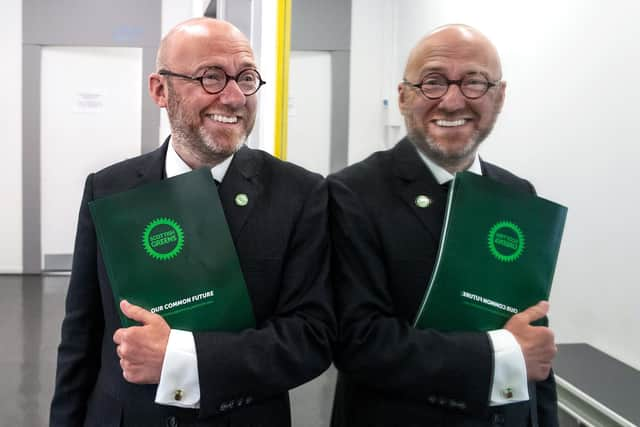Unlike Nicola Sturgeon, women like me did not choose their pronouns and we are not akin to racists for saying so – Susan Dalgety
I know, and have learned much more through direct experience, that some humans have variations in their sexual development, but are still either male or female. I know that some humans are sexually attracted to people of the same sex, and some to people of both sexes. And that some humans want to change their natal sex, either through medical intervention or by adopting the gender stereotypes of their chosen sex.
Like every woman and girl in this country, I know that, because of my sex, I have been discriminated against since my birth, from earning less than my male peers to being passed over for promotion.
Advertisement
Hide AdAdvertisement
Hide AdI know my female physiology means I am at risk of life-altering diseases and conditions such as endometriosis, cervical and ovarian cancer, post-natal depression, and the menopause.
And I know that the social, cultural, and economic challenges women and girls face across the world require specific laws and policies to address the discrimination we face daily.
The political parties vying for our vote on May 6 know this too, which why they have all promised policies focusing solely on the needs of women.
“The SNP has a proud record of fighting for gender equality,” boasts the ruling party, promising better miscarriage services and a dedicated Women’s Business Centre.


The Tories say they will launch a national campaign, focused on schools, to challenge attitudes towards sexual harassment (NB: sex-based oppression starts in childhood).
Scottish Labour’s Women’s Manifesto is the most comprehensive, informed by the lived experience of two generations of feminists, with pledges ranging from amending the recent Hate Crime Act to include misogyny to improving support for breastfeeding mothers.
But none of the main parties has the courage to tackle head on the issue that has defined Scottish feminism in recent years: the legal definition of a woman.
The Scottish government has stated its intention to reform the 2004 Gender Recognition Act (GRA) so that a person can change their legal sex simply by asserting they are male or female. That change was put on hold last year for further consultation, but the SNP’s manifesto suggests that if they are returned to power, they will press ahead with reform. And they will find support from the Scottish Liberal Democrats and the Scottish Greens, as both parties embrace the concept of self-identification with enthusiasm.


Advertisement
Hide AdAdvertisement
Hide AdWhy does it matter if a man can self-identify as a woman, I hear you ask? Put simply, if there is no legal definition of an adult female human, we cannot properly tackle sex-based oppression here in Scotland and around the world.
Take rape as an example. Last week, policy analysts Murray Blackburn Mackenzie (MBM) revealed that Police Scotland allows a rape suspect to self-identify as a woman, even before any change to the GRA. This perversion of biological reality will surely harm victims already traumatised by the sexual assault and will distort the statistics on which policy is based. It is quite simply institutional madness.
Yet any objection to self-identification is met with screams of “transphobia”. Women campaigners are dubbed neo-colonial and right-wing for daring to argue for sex-based rights.
Only two days ago, the Scottish Greens co-leader, Patrick Harvie, suggested on BBC Radio Scotland that women who believe sex matters are akin to racists. This man could be a government minister in a few weeks’ time, if the SNP needs to form a coalition with his party.
Women have lost their livelihoods for daring to speak out for women’s rights, and even one of the best-known and most-loved women on the planet, JK Rowling, was vilified for her feminism. Her plea that women receive “similar empathy, similar understanding” to trans people was met with derision by trans campaigners. Her books were burned, and some of the actors who owe their career to her talent turned their back on her.
And it now seems the most powerful woman in Scotland has turned her back on women. In a video for ‘Out for Scotland’ released earlier this week, Nicola Sturgeon announced that her “chosen pronouns are she and her”.
Stating your pronouns is the 2021 equivalent of wearing a campaign badge. It is a message to trans activists that you are on their side. It says you accept that a man with a beard and a penis is a woman if he says his pronouns are she and her.
And to underline her trans hero status, Sturgeon’s friend, New York-based actor Alan Cumming, has just written an article urging Scottish critics of self-identification to accept their concerns as a “fear of the unknown”.
Advertisement
Hide AdAdvertisement
Hide AdScotland’s women do not fear the unknown. We know only too well what scares us. Rape and sexual assault. The pain of menstruation, the challenge of the menopause. Genital mutilation. Poverty wages, domestic violence, careers interrupted because of childbirth, dying in childbirth, infertility, walking alone at night. And the sound of footsteps too close behind us.
Women live with fear all their lives. That is why the Suffragettes died so that women could have the power a vote brings. That is why feminists from the 1970s onwards have fought for women to have equal status in the law.
That is why Scottish women today are campaigning for our hard-won sex-based rights to be protected.
We don’t fear the unknown, Alan. We didn’t choose our pronouns, Nicola. We are not racists, Patrick.
We are women. We are adult female humans. And we will not be silenced.
A message from the Editor:
Thank you for reading this article. We're more reliant on your support than ever as the shift in consumer habits brought about by coronavirus impacts our advertisers.
If you haven't already, please consider supporting our trusted, fact-checked journalism by taking out a digital subscription.
Comments
Want to join the conversation? Please or to comment on this article.
